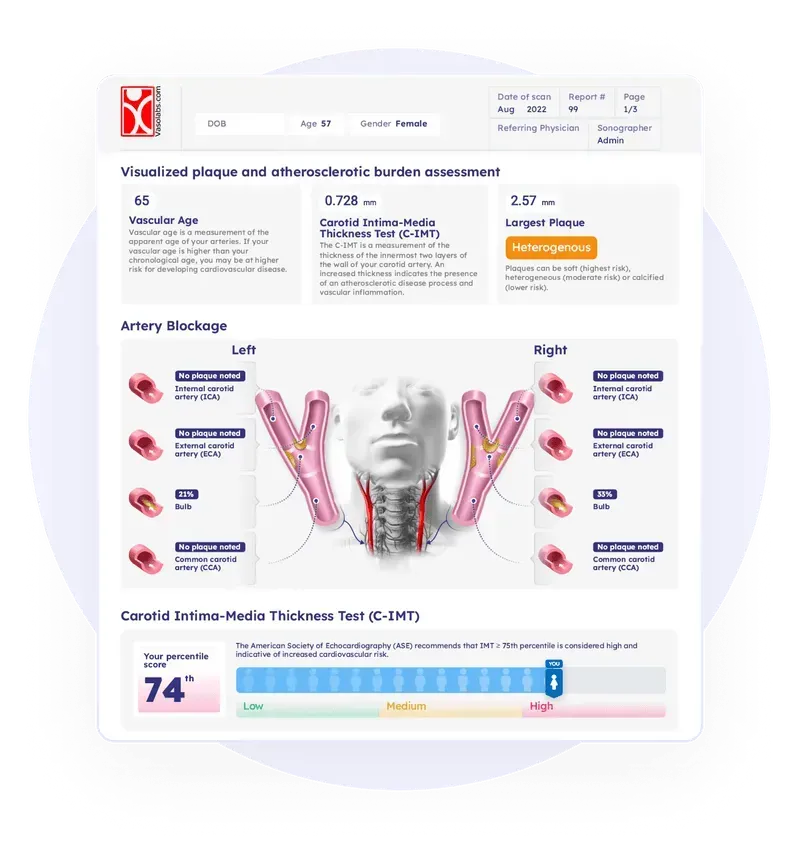801-797-2297
1414 South 600 West, Bountiful, UT 84010
Mon-Friday, 8am-5pm
801-797-2297 | Mon-Friday, 8am-5pm
Welcome to Our Blog: Vasolabs News and Education

The Mystery Behind Arterial Plaque and Its Connection to Heart Disease, Stroke, and CIMT Scan
What is Arterial Plaque?

Arterial plaque is a sticky, waxy substance that can build up in the arteries over time, leading to various health problems such as heart disease and stroke.
What Causes Arterial Plaque?
Arterial plaque is caused by a buildup of fatty substances, cholesterol, cellular waste products, calcium, and fibrin in the arteries. It can lead to serious health conditions such as heart disease and stroke.
The Role of Plaque in Stroke Risk

In a study conducted by the American Heart Association, it was found that individuals with high levels of arterial plaque are at a significantly higher risk of developing heart disease and experiencing a stroke. Additionally, research published in the Journal of the American College of Cardiology suggests that the presence of plaque in the carotid arteries can increase the risk of cardiovascular events by up to 50%.The link between arterial plaque and heart disease is a crucial one, as plaque buildup can restrict blood flow to the heart muscle, leading to chest pain (angina) and potentially causing a heart attack. Similarly, plaque in the carotid arteries can disrupt blood flow to the brain, increasing the risk of a stroke.
CIMT Scan: A Tool to Detect Arterial Plaque
One effective way to detect arterial plaque is through a Carotid Intima-Media Thickness (CIMT) scan, which uses ultrasound to measure the thickness of the carotid arteries.

One study published in the Journal of Cardiovascular Ultrasound found that CIMT scans are a reliable method for assessing atherosclerosis and predicting cardiovascular events. By identifying individuals with increased carotid intima-media thickness, healthcare providers can intervene early to prevent the progression of arterial plaque and reduce the risk of heart disease and stroke.
Another study in the Journal of Clinical Ultrasound highlighted the importance of CIMT scans in monitoring the effects of lifestyle interventions on arterial health. By tracking changes in carotid artery thickness over time, healthcare professionals can assess the impact of diet, exercise, and medication on reducing plaque buildup and improving cardiovascular health.
Managing risk factors such as high cholesterol, high blood pressure, smoking, and obesity can help prevent the buildup of plaque in the arteries. By understanding the causes of arterial plaque and taking proactive steps to maintain a healthy lifestyle, individuals can reduce their risk of heart disease and stroke.
Take Charge of Your Cardiovascular Health with Vasolabs' CIMT Scan

At Vasolabs, we are dedicated to helping men take charge of their heart health by offering proactive screenings for heart disease and stroke caused by arterial plaque. Our CIMT scan is a non-invasive and painless procedure that uses high-frequency sound waves to measure the thickness of the carotid artery walls. This valuable information helps us assess the presence of plaque and the risk of cardiovascular events. By unraveling the complexities of arterial plaque and its impact on heart health, you can take proactive steps to prevent and manage these potentially life-threatening conditions.
Schedule your CIMT scan today and take control of your cardiovascular health!
References:
Lee HY, Kim J, Kim U, Kim JH. Carotid Intima-Media Thickness and Cardiovascular Risk Prediction: A Narrative Review. Journal of Cardiovascular Ultrasound. 2018;26(2):65-69.
Homburg PJ, Plompen EP, Rosendaal FR, et al. Carotid intima-media thickness as a cardiovascular risk factor in obese youth: relationship to ambulatory blood pressure. Journal of Clinical Ultrasound. 2013;41(3):173-180.
Why should you get this C-IMT scan?
Informed patients make better decisions.

Early Detection of Heart Disease Risk
A C-IMT scan can act as an early warning system by identifying increased thickness in the artery walls long before any symptoms of heart disease or stroke become evident.

Personalized Treatment Plan
The results of a C-IMT scan can help your doctor tailor a treatment plan to reduce your risk of heart attack or stroke, which is the leading cause of death and disability in the world.

Non-Invasive and Safe
Unlike some other tests, the C-IMT scan is non-invasive and uses ultrasound, not radiation. It's safe and doesn't require any special preparation.

Family History
If you have a family history of early heart disease or stroke, the scan can provide valuable information about your own risk, helping you and your doctor to take preventive measures.

Peace of Mind
If you are anxious about your cardiovascular health, a vasometric scan can provide reassurance if your results are within a normal range.
Vasolabs Is A Premier Provider Of Safe, Convenient Heart Disease Screenings.
Vasolabs Is A Premier Provider Of Safe, Convenient Heart Disease Screenings.
Uses the newest ultrasound technology
Determines whether or not you have heart disease
Pain-free. Requires no wires, treadmills, or needles.
Takes only 15 minutes
Get your Easy-to-Understand Report within 24 hours
Optional Discussion with your Clinician
Schedule a test to see if you’re at risk of heart disease!
Identify Your Risks of Getting Cardiovascular Disease With a Simple C-IMT Scan!
Know if You Are at Risk for Heart Attacks, Strokes, and other Cardiovascular Diseases:
$499 $249
What's Included in your Report:
See your Vascular Age!
Soft or Calcified Plaque is visualized, you’ll see it all.
Track Your inflammation, Know your Artery Blockage.
Informed patients make better decisions.
Loved ones depend on you.
Do I Need a Heart Screening?
Here is a checklist of factors that put you at elevated risk for heart attack, stroke, and other forms of cardiovascular disease:
Over 40 years of age
Family history of heart disease/stroke
Overweight
Increased cholesterol level
High-fat diet
Tobacco user
High blood pressure
Diabetic
Metabolic syndrome
Erectile dysfunction
Psoriasis

Peace of Mind is Priceless

Looking back, it's chilling to realize how close I came to the edge. I opted for a test at Vasolabs on a whim, without any particular symptoms. Boy, am I glad I did! Turns out, my arteries were nearly clogged up - something regular doctors wouldn't have caught unless there were signs of a problem. By the time I got a couple of second opinions and returned to my regular doctor, my arteries were 95% blocked. If I hadn't taken the test when I did, I could have had a stroke. Trust me when I say this, going to Vasolabs was one of the best decisions I've ever made.
- George B

I was really worried about getting a heart attack because its already happened in our family. So taking this test gave me the peace of mind I was looking for. And it was so cool to see the age of my artery was younger than I was!!
- Barbara L.

I went to Vasolabs for their C-IMT testing, thinking it'd be a complicated deal, but nope! It was as easy as getting a photo taken. And guess what? They found an issue that could've been a silent threat. Thanks to them catching it early, my doctor and I are on top of it now. Honestly, I feel like I dodged a bullet. Big thumbs up for Vasolabs!
- Walter S.

I saw an ad on Facebook and I got the C-IMT Test for myself and my husband, it was such an easy process. And a great gift idea for family. It was really fun to look at the results and good to know I need to work on my health.
- Jessica F.
Frequently Asked Question
What is a C-IMT scan?
A C-IMT Scan is a non-invasive procedure that uses ultrasound technology to measure the thickness of your carotid arteries' walls. These arteries, located on each side of your neck, supply blood to your brain. Over time, plaque can build up in these arteries, causing them to thicken. This is often an early sign of atherosclerosis, a disease that can lead to serious conditions such as heart attacks and strokes.
Where do I go to get this scan?
For your quick, 15-minute appointment, simply head over to our facility located at 1414 South 600 West, Bountiful, UT 84010.
Who takes my test?
Dean Ence, an expert sonographer, will be handling your fast, no-pain test to figure out the 'age' of your arteries. This test checks how thick your artery walls are - thicker walls can mean inflammation. It's all simplified for you to understand easily. We also spot and show plaque, whether soft or hard, in your arteries. You get detailed pictures from the ultrasound for your records. Taking care of your health is our main goal!
How long does the C-IMT Scan and Report take?
The duration of the C-IMT scan can vary depending on various factors, like the complexity of the patient's condition. Typically, a Vasometric scan takes around 15 minutes to complete. The report is done and delivered within 24 hours to you.
Will my insurance cover this C-IMT Scan?
No. Hospitals charge $800, but our cost is $249.
Our Mission:
Vasolabs is dedicated to promoting heart health by providing innovative, easy-to-access tests. We empower people with insights into their vascular health for early risk detection.

